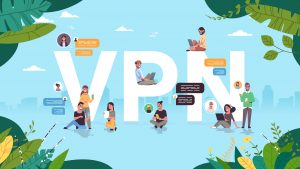Manage Your Account
Have questions? Give us a call
Reach out to us anytime
Manage Your Account
Have questions? Give us a call
Reach out to us anytime


A virtual private network, or VPN for short, is best defined as “an encrypted connection over the internet from a device to a network.” Think of this connection as a protected “tunnel” through which you can access everything online while appearing to be in the location of the VPN server you’re connected to. This provides you with a high level of online anonymity, offers an added layer of security, and allows you to access the entire internet without restrictions.
VPN technology is a must for anyone who’s concerned about protecting not just their data, but their identity and location as well. A reputable VPN will secure your internet connection, safeguard your privacy, and keep you protected from hackers or anyone else who might be trying to spy on your online activity.
Initially, VPNs were developed to give businesses a way to connect employees who aren’t physically at the workplace to the company’s network. Connecting remote employees to a central work server allows them to access files and other resources, as well as any confidential information that they may need in a safe, secure environment.
In response to widespread data breaches and other cyber-threats, individuals are increasingly using VPNs to create a secure path as they browse the internet.

Before we delve into how VPNs function, it’s important to explain what the term “internet traffic” means. Internet traffic is the flow of data between your computer and the internet – this applies whether you’re using a desktop, laptop, smartphone, or tablet.
When you access the internet without a VPN, all of your internet activity – including browsing history, downloaded files, online banking details, and passwords – can easily be intercepted by other people. This could include your internet service provider (ISP), government agencies, your employer, or even cybercriminals.
When you connect through a VPN, your data is safely encrypted as it travels wherever it needs to go. This means that the data is protected when it goes from your computer to the VPN server, and then to your final destination (whether that’s a website or the server of any app you’re serving). As a result, websites only “see” the VPN’s IP address and not yours. Additionally, your ISP only recognizes that you’re using a VPN but doesn’t get to tag along and keep tabs on where you go or what you do.

As the world adapts to the “new normal” prompted by the COVID-19 pandemic, organizations worldwide have been scrambling to safeguard their remote employees. Not surprisingly, VPN software usage has escalated dramatically as the need for remote working rises.
Mass surveillance, corporate tracking, and internet censorship are three other driving forces that will continue to push VPN software usage even higher. ISPs are increasingly restricting access to various websites – from adult content to torrenting sites. As people are enlightened to the growing risks regarding data collection and security threats, VPN usage will continue to expand.
We’ve touched on most of these points already, but a deeper dive will be beneficial to truly demonstrate the benefits of VPNs:

Many countries worldwide censor the internet (or specific websites) because certain content doesn’t align with their government’s political or religious beliefs. If you’re living in or traveling to a country with internet restrictions, you’ll need a VPN to be able to freely and securely browse online. In some areas of the world, basic tasks like Googling or updating your Facebook status are impossible without a VPN. Because your actual location is being “spoofed” when you connect to the internet with a VPN, you can bypass geographical restrictions and gain access to online content that’s otherwise unavailable in your region.

Nearly every website you visit tracks your online activity and harvests your data. Advertising networks such as Facebook, Google, and Twitter constantly collect information about you through your internet traffic in order to show you targeted ads. However, it’s important to know that these entities are also free to sell your info to interested third parties. By encrypting your data, these networks will be unable to collect info on you, which gives them less influence over what kind of content you see online.
Your internet protocol (IP) address is a personal identification code that’s unique to your internet connection. It reveals your physical location and is tied to the individual who pays your internet service provider. With your IP address, you’re both recognizable and traceable online, no matter what you’re doing.
The instant you connect with the VPN server, your personal IP address and location are hidden from view. Websites and other parties will only be able to trace your online activities back to the VPN server, not to you personally and not to your actual location. This allows you to surf the web with greater anonymity.

Hackers and other cybercriminals use a variety of techniques to detect web traffic. They’re even able to hijack users’ accounts on websites that don’t use the HTTPS security protocol.
Public Wi-Fi networks can pose a particular threat to internet users. Individuals connected to the same network can easily tap into your devices, access your data, and steal your personal information while you browse the web obliviously.
When you use a VPN to connect to a public Wi-Fi network, any data you send, receive, or access online is automatically encrypted, rendering it much more difficult to intercept and view.
Knowing that your confidential data – such as email logins, bank passwords, credit card info, and images or other files – is potentially exposed to hackers and other malicious denizens of the internet should certainly give you pause. A VPN provides an added line of defense against cyberattacks of all kinds – so why wouldn’t you take advantage of its capabilities?
By necessity, practicality, or some combination of the two, more and more businesses these days are enabling their employees to work from home or abroad. VPNs are often used to securely connect remote workers – and vendors, as necessary – to the requisite resources, files, and networks that they need. Encrypted connections allow users to interact on the network while ensuring that the company’s data remains private.
A natural byproduct of remote accessibility is an increase in overall productivity for the business. When employees have access to your network 24/7, they’re able to work outside the typical 9 to 5 business hours, from wherever they choose

Ad companies can still use browser cookies to track your path across the internet, even after you’ve left their sites. If this is a concern for you, there are ways to block third-party cookies in every web browser.

VPN services are obligated to abide by the laws of the country in which they are officially based. As such, they’re legally bound to respond to subpoenas and warrants from law enforcement when requested.

If someone targets you specifically and is willing to put forth the effort, they’ll eventually get what they’re after. Having a solid cybersecurity plan in place can help.

A VPN is designed to secure your online connections and data. It’s not engineered to protect your system from malicious software. Using antivirus and antimalware programs is always a smart move.

Given all the different ways someone can be identified online, a VPN alone won’t render you completely anonymous. With the vast resources of surveillance agencies such as the NSA, it’s likely quite difficult to ever achieve 100% online anonymity. Other methods could result in uncovering your online identity, but a VPN will protect your privacy very well, in most cases.

When you’re using a VPN, a lot is going on in the background. Your computer is encrypting and decrypting packets of data, which are being routed through a remote server. All of this takes more time and processing power, which will ultimately affect your internet speed. Because your latency (or “ping”) is increasing, the speed at which you upload or download data will decrease. With higher-quality VPNs, the lag is barely noticeable, whereas others can cause a considerable slowdown. VPN speeds may also be limited by the type of device you’re using, your network, or due to your internet provider “throttling” VPN connections.

When the internet was first constructed, not a lot of thought was given to security or privacy. At first, it was merely a cluster of shared computers at research institutions. Computing power was so limited that any encryption could have made functionality extremely difficult, if not impossible. On the contrary, the primary focus was on openness, not on defense.
Today, most of us have a number of devices that connect to the web which are vastly more powerful than the top computers of the early days. But the internet hasn’t implemented many fundamental improvements. Only in the past few years has HTTPS become widespread, for example.
By and large, the responsibility lies on individuals to protect themselves. Antivirus apps and password managers can go a long way toward keeping you safer, but a VPN is a uniquely powerful tool that you should absolutely have in your personal security toolkit, especially in today’s connected world.
While a VPN isn’t an absolute necessity for using the web, it will provide you with better overall security, improved performance, remote access, and greater anonymity.
Cybersecurity has never been more important. We live in an increasingly connected world, which enables cyberattackers to constantly find new ways to carry out digital attacks. Even the most vigilant business owners and IT managers can become overwhelmed with the stress of maintaining network security and protecting their data.
DataGroup Technologies offers a wide variety of cybersecurity services to help protect your business from cyberthreats, including security risk assessments, email security solutions, web & DNS filtering, and next-generation firewalls. Call us today at 252.329.1382 to find out more about how we can help you #SimplifyIT!
Subscribe now to keep reading and get access to the full archive.